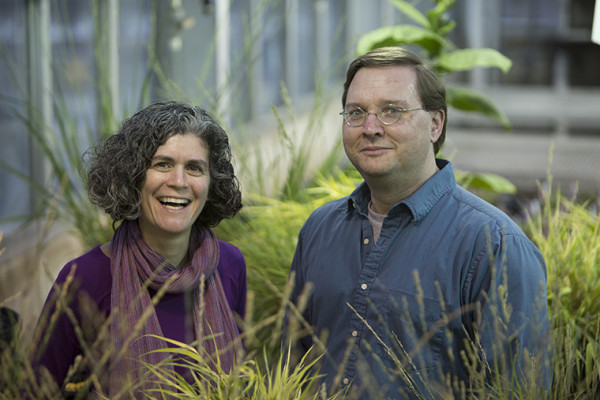Students win Breast Cancer Startup Challenge
An interdisciplinary group of graduate students including Washington University’s (from left) Anurag Agarwal, Whitney Grither and Hirak Biswas was one of 10 winning teams in the Breast Cancer Startup Challenge. The international competition aimed to bring breast cancer discoveries out of the lab and closer to market to help patients.
NF symposium to focus on tumor disorders
The School of Medicine is home to an internationally renowned center for multidisciplinary research of neurofibromatosis and comprehensive care of patients affected by it. The university’s Neurofibromatosis Center will host a symposium May 16 that will bring together patients, their family members and researchers to discuss the latest insight into the diagnosis and treatment of NF.
Genome regions once mislabeled ‘junk’ linked to heart failure
Large regions of the genome that were once referred to as “junk” DNA have been linked to human heart failure, according to research led by Jeanne Nerbonne, PhD, of Washington University School of Medicine in St. Louis.
Workshop held to help recruit women, minorities
Participants in the Faculty Reach Out Program (FROP), held earlier this month at the School of Medicine, attended a two-day workshop that included meetings with faculty to discuss clinical and research interests, tours of research facilities and networking opportunities with other FROP participants. FROP was initiated to create a pathway to recruit women and underrepresented minorities for faculty appointments.
Aging expert Stone to deliver annual Friedman Lecture May 8
Robyn I. Stone, PhD, noted researcher and leading international authority on aging and long-term care policy, will deliver the annual Friedman Lecture Thursday, May 8, in Brown Hall on the Danforth Campus of Washington University in St. Louis. A panel discussion will follow. The event will take place from 8:30 a.m. to noon and is free and open to the public. For details and to register, visit here.
New study examines disparities in Medicaid spending on children in the welfare system
In the new health-care climate of the Affordable Care Act and efforts to expand Medicaid to accommodate more individuals and children, the need to closely examine ways to best use government funding is becoming increasingly evident. A new study from the Brown School examines racial and ethnic differences in Medicaid expenditures for children in the welfare system who use psychotropic drugs.
Construction of new medical records office begins in CAM lobby April 21
Construction of a new medical records customer-service office will begin the evening of Monday, April 21, in the Center for Advanced Medicine (CAM) lobby. The office — part of Barnes-Jewish Hospital — is relocating to CAM from the first floor of Shoenberg Pavilion as part of the Campus Renewal Project.
New center aims to use immune system to fight cancer, other diseases
A new center at the School of Medicine will help scientists use the power of the immune system to fight infections and cancers. The Center for Human Immunology and Immunotherapy Programs is part of BioMed21, Washington University’s initiative to accelerate basic science discoveries into improved diagnosis and treatment for patients.
Gereau named Brown professor of anesthesiology
Robert W. Gereau IV, PhD, has been named the Dr. Seymour and Rose T. Brown Professor of Anesthesiology at the School of Medicine. He studies the molecular mechanisms involved in pain sensation, and his research includes optogenetics, which uses light signals to activate or deactivate nerve cells responsible for transmitting pain signals to the brain.
Danforth Fellowships in plant sciences announced
Chancellor Mark S. Wrighton has announced the creation of new four-year fellowships in the Division of Biology and Biomedical Sciences, made possible by a generous gift from William H. Danforth. Danforth hopes the new fellowships will attract highly motivated students to this field of study and foster a culture of intellectual entrepreneurship focused on research and innovation in plant sciences.
Older Stories

